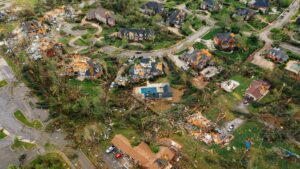
As the devastating effects of Hurricane Helene continue to unfold, the political landscape in key states is being reshaped in real-time. While the mainstream media (MSM) has been relatively quiet on the disaster’s impact, conservative voices are raising concerns about how this natural disaster could distort the upcoming election. In this piece, we’ll explore how infrastructure damage in Republican-leaning states may suppress voter turnout, the government’s slow response, and the need for emergency voting measures.
Infrastructure Damage and Voter Turnout
Hurricane Helene has crippled major swathes of the Southeast, including crucial “red” states like Florida, Georgia, and North Carolina. With polling stations destroyed, roads blocked, and many areas still lacking power, access to in-person voting is going to be a logistical nightmare unless significant recovery steps are taken.
These areas tend to lean conservative, which means that a failure to address these issues could unfairly skew the results. Historically, conservative voters have favored in-person voting over mail-in ballots, making the closure of polling places particularly damaging for Republicans. While liberals might embrace absentee voting as an alternative, conservative voters could be left disenfranchised if solutions aren’t found quickly.
From a conservative standpoint, this disaster highlights the vulnerability of physical voting infrastructure, which we’ve seen compromised in past natural disasters. But why is the response so slow, and how might it affect key conservative strongholds in these states?
Slow Government Response: Is It Incompetence or Lack of Resources?
There’s no question that the government’s response has been far from ideal. FEMA and other federal agencies are delivering food and water, but that’s barely scratching the surface of what’s needed. The lack of military deployment for more critical tasks, such as road clearing and restoring access to polling stations, raises serious concerns. The Army Corps of Engineers, typically relied upon for rebuilding infrastructure after disasters, seems conspicuously absent. The conservative viewpoint here is that this sluggish response might reflect broader issues of bureaucratic inefficiency, or worse, a lack of financial readiness due to mismanaged budgets under the current administration.
Under President Biden and Vice President Harris, we’ve seen a continued expansion of federal spending on a variety of programs, which has raised questions about whether resources for emergency management have been stretched thin. The possibility that this administration simply lacks the funds or the resolve to deploy essential resources to conservative areas could have political consequences. Could the failure to prioritize disaster recovery in red states be deliberate?
Drone Bans and Missteps: Government Blocking Private Efforts
Reports of private citizens attempting to conduct rescue missions and deliver aid have surfaced, only to be thwarted by government intervention. Drone usage, which could be instrumental in search-and-rescue efforts, is reportedly being limited by airspace restrictions, stalling recovery initiatives by private citizens and organizations. In disaster-prone states, conservative communities often rely on themselves and local volunteers, rather than waiting on government handouts. The government’s apparent discouragement of these private efforts only adds to the frustration many feel toward federal overreach. Could this be another example of the administration undercutting self-reliance in favor of centralized control?
Emergency Voting Measures: Are They Enough?
While states have some experience with implementing emergency voting measures after hurricanes, the question remains whether these measures will come fast enough to preserve the integrity of the election. Absentee ballots might offer some relief, but this option presents problems in and of itself. Conservative voters have historically expressed distrust of mail-in voting due to concerns over fraud, making it a less than ideal alternative. If mail-in voting is the only viable solution, conservative voices may again cry foul, alleging election interference by pushing a voting method that favors Democrats.
Temporary polling stations and extended early voting are potential solutions that conservative advocates should push for in these affected areas. However, the pace of the government’s recovery efforts raises doubts about whether these measures will be implemented before Election Day.
The Stakes in Key Red States
Let’s be clear about what’s at stake. Florida, Georgia, and North Carolina have consistently been battlegrounds where conservative and liberal forces compete fiercely for dominance. Lower voter turnout in these red states could open the door for Democrats to make gains, particularly in tight races. The 2024 election is not just about the presidency; it’s about the future of Senate control, the makeup of state legislatures, and local governments.
If conservative voters in hurricane-ravaged regions are left without adequate voting access, the Republican Party stands to lose crucial votes in an election already stacked against them due to biased media narratives and unfair pandemic-era voting changes. A low turnout among conservative voters in key areas could tilt the scales in favor of Democrats, potentially altering the national political landscape for years to come.
Government Preparedness and the 2024 Election
It’s worth asking: why was the government so unprepared for Hurricane Helene? As conservatives have argued for years, the government excels at waste and inefficiency while neglecting its core responsibilities—like protecting citizens and preserving the democratic process. Rather than focusing on disaster preparedness, the Biden-Harris administration has been prioritizing expansive federal programs, leaving states vulnerable when real emergencies arise.
The conservative perspective is that this disaster exposes the dangers of bloated government spending on social programs and regulatory overreach while underfunding critical infrastructure and emergency response capabilities. If the administration had focused on building resilient infrastructure and cutting red tape, Hurricane Helene’s damage might not have been so catastrophic.
Conclusion: The Election Hangs in the Balance
Hurricane Helene is not just a natural disaster—it’s a political disaster waiting to happen. For conservative voters, the implications are clear: the slow response, lack of preparedness, and mishandling of emergency measures could jeopardize voter turnout in key states, potentially shifting the election in favor of Democrats.
To prevent this, it’s essential for conservative leaders to push for quick action on restoring infrastructure and implementing emergency voting measures. Without these steps, the 2024 election may be marred by controversy, disenfranchisement, and lost opportunities for Republican voters.


